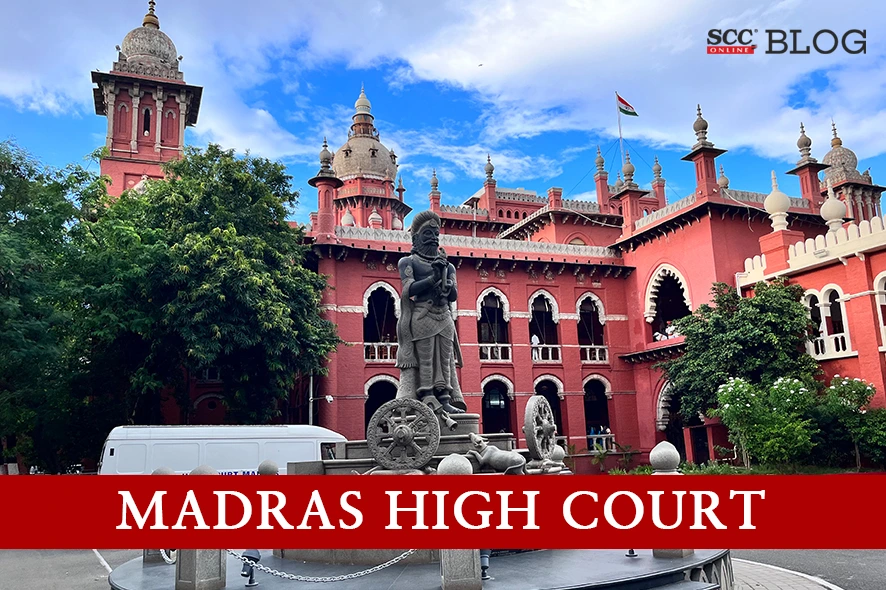Madras High Court: In a writ petition challenging the appointment of respondent 3 to the post of Jayakondan Village Panchayat Secretary, as she was living in the village, but had shifted her residence to her husband’s place after her marriage and hence she could not be considered as a person residing in Jayakondan Village, R.N. Manjula, J. while dismissing the petition, said that a married woman though ordinarily lives at her husband’s place, cannot be presumed to have disowned her residential rights at her parents’ house on account of her marriage.
The petitioner alleged that respondent 3 has secured the employment by forgery and misrepresentation. He submitted that respondent 3 is not a resident of Jayakondam and among the applicants who applied for the post, the petitioner alone is the eligible person because of his permanent residence at Jayakondam. It was further submitted that as per the employment exchange registration roster, the petitioner is senior and respondent 3 is much junior and had registered in the employment exchange only for the purpose of this post.
The Court noted that the terms of appointment just need sponsorship from the employment exchange and there is no compulsion that the senior most person so sponsored should be selected. But, while sponsoring the individuals registered with the employment exchange, a person who has registered earlier and waiting, should not be bypassed for the purpose of sponsoring a person who had registered later. In the case in hand, both the petitioner and the respondent 3 have been sponsored and hence there cannot be any grievance in this regard.
The petitioner claimed that respondent 3 who was living in Jayakondam, had shifted her residence to her husband’s place after her marriage and hence she could not be considered as a person residing at Jayakondam. It was submitted that the petitioner is the neighbour of the respondent 3 parents’ house and hence he is aware of the fact that she had moved to her husband’s place after marriage.
The Court said that Jayakondam is the native place of respondent 3 and she is born and brought up there and her parents’ are permanently residing at Jayakondam. A married woman though ordinarily lives at her husband’s place, cannot be presumed to have disowned her residential rights at her parents’ house on account of her marriage. For getting a separate ration card after her marriage her name would have got deleted from her parents’ ration card and included in her husband’s ration card. With that alone it cannot be said that a married woman had severed her ties with her parents’ place and her residential status in respect of her parent’s house has come to a closure once and for all. The rules of marriage do not impose any such condition on a woman.
The Court said that the parents of the respondent 3 are still in Jayakondam and she has every right to visit or stay with her parents at Jayakondam at her own convenience or choice. It cannot be perceived that respondent 3 is a stranger to her natal family and that she cannot claim any residential status at Jayakondam in view of her marriage.
The Court remarked that, in today’s world, men and women go to several places for the sake of education or occupation, but still consider their native place as their permanent residence. There is a notion that a married woman completely abandons her native place and assumes her husband’s place as her only place of residence. If a married woman chooses to live between her natal home and marital home on account of her employment, business or otherwise nothing can prevent her to exercise her option.
The Court said that to retain or waive the native address is at the will of a married woman or her family members in certain circumstances. The will of a woman coupled with the existence of a house, in which she opts to live either by exercising her right or by obtaining consent, is itself sufficient to provide her with a residential certificate relating to that place.
The Court said that the very object of insisting on the local residence certificate for the post of the Panchayat Secretary is to ensure the immediate availability of the secretary in order to handle any sudden official urgency. Further, a person who is locally placed can have better acquaintance with the local populace. He can also be aware of the local needs, problems and all connected situations to make a better contribution.
Further, the Court noted that Respondent 3 has produced the exchange of legal notices between herself and her husband and submitted that there is an ongoing marital discord between themselves. The Court remarked that the above facts are completely personal to the petitioner, and she should not have driven to such a compulsion of revealing these private facts about herself for the sake of this petition.
The Court noted that the District Collector and Special Officer have no objection to the documents filed by the respondent 3, and according to them they are genuine, and they are not the products of forgery or misrepresentation.
Thus, while dismissing the petition, the Court remarked that the petitioner has his own adverse idea about the entitlement of residential status in parents’ house, with that adversity in mind, this petition has been filed.
[G. Mayakannan v District Collector, 2023 SCC OnLine Mad 7460, Order dated 30-10-2023]
Advocates who appeared in this case :
For Petitioner: Advocate P. Suresh Babu
For Respondents: Special Government Pleader G. Nanmaran, Advocate C. Prakasam






